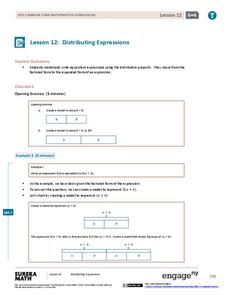EngageNY
Using the Identity and Inverse to Write Equivalent Expressions
The fifth installment in the series of 28 lessons helps math scholars explore the result of adding opposite numbers and multiplying reciprocals. Through this exploration, they develop a working definition of identity and inverse properties.
EngageNY
Distributing Expressions
You know how to factor expressions; now it's time to go the opposite way. Scholars learn to write algebraic expressions in expanded form using the distributive property. A problem set helps them practice the skill.
Curriculum Corner
7th Grade Math "I Can" Statement Posters
Translate the Common Core math standards into a series of achievable "I can" statements with this collection of classroom displays. Offering posters for each standard, this resource is a great way to support your seventh graders as...
West Contra Costa Unified School District
Simplifying Radicals – Day 1
It doesn't get simpler than this. Scholars first learn to simplify radicals by determining the prime factors of the radicand. The lesson progresses to simplifying radicals involving algebraic expressions in the radicand.
West Contra Costa Unified School District
Graph Square Root and Cube Root Functions
Scholars first learn to graph square root and cube root functions by creating a table of values. They then learn how to graph functions from transformation of the graphs of the parent square root and cube root functions.
Virginia Department of Education
Balanced
Bring balance to your lesson plans with an activity that asks individuals to solve one-step linear equations with inverse operations. Balance scales help learners understand the concept of isolating the variable.





